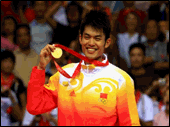|
閱讀理解
The match was over.The winner took off his shirt.Then, he pulled off his shoes and threw them into the crowd.Finally, he ran back to the badminton court and saluted(敬禮)the audience.

This is how Chinese badminton player Lin Dan celebrated.On November 21, 2010 Lin Dan got the first place in the badminton men’s singles final at the Asian Games in Guangzhou.
Known as ‘Super Dan’, the 27-year-old Lin Dan is said to be one of the greatest players in the world.He won nine top titles between 2002 and 2004.In the 2008 Beijing Olympics, he won a gold medal.He also won several gold medals from the 2006 and 2007 World Championships.
Lin Dan is a left-handed player and can cover the court quickly.On the court, Lin plays with a confident(自信的)and showy style.Some people say he is ‘a(chǎn)rrogant( 傲慢的)’.Some people also say he has hot temper.When he was playing in South Korea in 2008, he stopped the match and threw his racket(球拍)to the ground for the wrong line calls.
He once said, ‘Since I started to play badminton at the age of 6, I’ve been playing with great confidence.This is what I am like.’
|
(1) |
|
On November 21, 2010, Lin Dan won the gold medal at _________.
|
| [ ] |
A. |
Olympic Games
|
B. |
the Asian Games in Guangzhou
|
C. |
World Championships
|
D. |
none of them
|
|
(2) |
|
How many golds did Lin Dan get between 2002 and 2004?
|
| [ ] |
A. |
9
|
B. |
10
|
C. |
12
|
D. |
13
|
|
(3) |
|
What does “hot temper”mean in the fourth paragraph?
|
| [ ] |
A. |
體溫高
|
B. |
熱情
|
C. |
火爆脾氣
|
D. |
容易熱
|
|
(4) |
|
Which of the following is TRUE according to the passage?
|
| [ ] |
A. |
Lin Dan is a right-handed player.
|
B. |
Lin Dan is said to be one of the greatest players in the world.
|
C. |
Lin Dan is good-tempered.
|
D. |
Lin Dan seems to be quiet and gentle.
|
|
(5) |
|
The word “________”can best describe Lin Dan.
|
| [ ] |
A. |
arrogant
|
B. |
confident
|
C. |
lucky
|
D. |
hot-tempered
|
|
